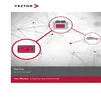
Dive into the essentials of ABB 800 XA DCS in this comprehensive training course designed for new users and refresher candidates. Participants will explore system architecture, basic operations, and configuration techniques. The course covers effective handling of real-time data management, alarm management, and user interface customization, providing practical skills for optimizing process control and enhancing operational efficiency. It is ideal for operators, system engineers, and maintenance staff looking to solidify their foundation in ABB 800 XA DCS.
ABB 800 XA DCS Interview Questions Answers - For Intermediate
1. Discuss the scalability of ABB 800 XA DCS.
ABB 800 XA is highly scalable and suitable for small single-node installations to large, multi-node global deployments. It can expand in terms of connected hardware, functionality, and integrated applications, adapting to growing industrial needs.
2. What protocol support does ABB 800 XA offer for device communication?
It supports a wide range of communication protocols including OPC UA, IEC 61850, Profibus, and more. This allows the DCS to communicate with a diverse array of industrial devices and systems, enhancing interoperability.
3. How are software updates handled in ABB 800 XA?
Software updates in ABB 800 XA are managed through a central system that ensures compatibility and minimal disruption. Updates can include security patches, new features, and performance improvements, crucial for maintaining system integrity.
4. What is the role of OPC in ABB 800 XA?
OPC (OLE for Process Control) plays a crucial role in ensuring seamless communication between various hardware and software components within the DCS and external systems, facilitating data exchange and system interoperability.
5. How does ABB 800 XA contribute to predictive maintenance?
By analyzing historical and real-time data, ABB 800 XA can predict equipment failures and system anomalies, allowing preemptive maintenance actions that minimize downtime and extend equipment life.
6. Explain the concept of 'System 800 XA High Integrity' in ABB 800 XA.
System 800 XA High Integrity refers to the safety system integrated within the DCS, designed to provide high levels of safety and reliability. It ensures fail-safe operations and protects personnel and equipment from process anomalies.
7. How is data reporting handled in ABB 800 XA?
Data reporting in ABB 800 XA involves the generation of customized reports that include operational data, system performance, and compliance with regulatory requirements. These reports can be scheduled or triggered based on specific events.
8. Discuss the integration of ABB 800 XA with mobile technology.
ABB 800 XA supports mobile integration, allowing operators and maintenance personnel to access real-time data, receive alarms, and perform control tasks directly from mobile devices, enhancing flexibility and responsiveness.
9. What training is required to operate ABB 800 XA effectively?
Operators and maintenance personnel require comprehensive training covering system architecture, operation, troubleshooting, and safety. Ongoing training is also important as system updates and new features are introduced.
10. How does ABB 800 XA facilitate regulatory compliance?
The system ensures compliance with industry-specific regulations by providing necessary controls, data logging, and reporting features. It helps maintain standards in areas such as environmental protection, safety, and quality control.
11. Can ABB 800 XA be used in the energy sector?
Yes, it is widely used in the energy sector for applications such as power generation, grid management, and renewable energy integration. It enhances operational efficiency and energy management in complex energy distribution networks.
12. What are the benefits of using ABB 800 XA in the oil and gas industry?
In the oil and gas industry, ABB 800 XA enhances safety, operational efficiency, and compliance with stringent industry regulations. It provides robust control and monitoring capabilities for refining, transportation, and distribution processes.
13. Discuss the challenges of implementing ABB 800 XA DCS in a manufacturing environment.
Challenges include ensuring seamless integration with legacy systems, training staff, managing cybersecurity risks, and optimizing system performance to match the specific needs of manufacturing processes.
14. How does ABB 800 XA handle version control and configuration management?
ABB 800 XA includes tools for version control and configuration management that help in tracking changes in system programming and configuration, ensuring consistency and reliability across the system's lifecycle.
15. What future trends in automation can be integrated with ABB 800 XA?
Future trends such as AI-driven analytics, increased use of IoT devices, and advanced robotics can be integrated into ABB 800 XA, further enhancing its capabilities in predictive analytics, real-time monitoring, and autonomous operation.
ABB 800 XA DCS Interview Questions Answers - For Advanced
1. How does ABB 800 XA contribute to environmental sustainability?
Environmental sustainability is a key focus of ABB 800 XA DCS, which includes features designed to minimize environmental impact through efficient resource management. The system's energy management tools optimize the use of electricity, gas, water, and other resources, reducing waste and emissions. Additionally, ABB 800 XA supports the integration of renewable energy sources into industrial processes, facilitating a shift towards greener operations. The system also provides comprehensive data collection and reporting capabilities that help comply with environmental regulations and corporate sustainability goals.
2. What are the specific benefits of ABB 800 XA for the pharmaceutical industry?
In the pharmaceutical industry, ABB 800 XA DCS offers significant benefits, including compliance with stringent regulatory standards like FDA 21 CFR Part 11, which demands rigorous data handling, security, and audit trails. The system enhances batch consistency and quality control through precise process automation and monitoring. Its detailed data logging and electronic signature capabilities ensure traceability and accountability throughout the manufacturing process. Additionally, ABB 800 XA's flexibility in process adaptation and scalability supports the dynamic nature of pharmaceutical manufacturing, accommodating everything from small-scale production to full-scale operations.
3. Discuss the training and certification programs offered by ABB for operators and engineers using the 800 XA system.
ABB provides comprehensive training and certification programs for operators and engineers working with the 800 XA DCS. These programs cover various aspects of the system, from basic operations and maintenance to advanced troubleshooting and system optimization. Training is delivered through a combination of classroom sessions, online courses, and hands-on simulations, ensuring that participants gain practical experience. ABB also offers customized training solutions tailored to specific industry needs or specific plant configurations, enhancing skill development and ensuring efficient system operation.
4. How does ABB 800 XA handle the challenges of large multi-site implementations?
For large multi-site implementations, ABB 800 XA DCS offers a centralized management approach that allows consistent control and monitoring across different locations. The system can be configured to synchronize operations and data across sites, facilitating centralized decision-making and resource allocation. Scalable network architectures and robust communication protocols support reliable data transfer and system performance, even over large geographical distances. Additionally, ABB provides global support and service networks, ensuring that system maintenance and upgrades are handled efficiently, regardless of the plant location.
5. What advancements in user interface and experience do ABB 800 XA provide?
ABB 800 XA DCS emphasizes advancements in the user interface (UI) and user experience (UX) by incorporating intuitive design principles and leveraging modern visualization technologies. The system offers customizable dashboards and user-friendly graphical interfaces that provide clear and actionable insights into process operations. Touchscreen capabilities, context-sensitive navigation, and mobile access are also integrated, enhancing accessibility and operator mobility. These UI/UX improvements facilitate quicker decision-making and improved situational awareness, ultimately leading to enhanced productivity and safety in industrial operations.
6. Describe the procedure for upgrading the ABB 800 XA DCS system.
Upgrading the ABB 800 XA DCS involves a systematic approach to ensure minimal disruption to ongoing operations. The process typically starts with a thorough assessment of the existing system to identify upgrade requirements and compatibility issues. ABB then provides a detailed upgrade plan, which might include hardware replacements, software updates, and configuration changes. The upgrade procedure is often performed in phases to limit downtime, with critical systems being prioritized. Throughout the process, simulation tools are used to test new functionalities before they go live. Post-upgrade, ABB supports with comprehensive testing and re-training of personnel to ensure that the system operates reliably under the new setup.
7. How does ABB 800 XA integrate with Internet of Things (IoT) technologies?
ABB 800 XA DCS is well-suited to integrate with IoT technologies, enhancing its capabilities in monitoring and control. The system can connect with a multitude of IoT devices to collect vast amounts of data from sensors and actuators spread across various locations. These data points are then analyzed in real-time to optimize processes, predict maintenance needs, and enhance operational decisions. ABB 800 XA's ability to handle big data analytics allows it to leverage IoT data effectively, integrating cloud-based services and edge computing to process data closer to the source, thereby reducing latency and improving response times.
8. What is the impact of digital twin technology on the operation of ABB 800 XA DCS?
Digital twin technology in ABB 800 XA DCS offers a virtual representation of physical assets, processes, or systems. This technology facilitates real-time monitoring, simulation, and testing of processes in a virtual environment, mirroring the real system. By employing digital twins, operators can visualize the impact of potential changes without affecting the actual system, optimize operations, and predict outcomes under various scenarios. This not only enhances operational efficiency and reduces risk but also aids in training staff under simulated conditions that replicate real-world situations without the associated risks.
9. Discuss the remote operation capabilities of ABB 800 XA DCS.
Remote operation capabilities in ABB 800 XA DCS are critical for modern industries requiring operational flexibility. The system allows operators and managers to access real-time data, control processes, and receive alerts from anywhere, at any time, using secure connections. This is facilitated through VPNs and encrypted communications ensuring data security. Remote capabilities are particularly beneficial for managing operations across multiple sites or in harsh environments where on-site presence is limited. ABB 800 XA also includes features for collaborative operations, allowing multiple users to view and interact with the system simultaneously from different locations.
10. How does ABB 800 XA ensure compliance with international safety standards?
ABB 800 XA DCS adheres to international safety standards such as IEC 61508 for functional safety and IEC 62443 for cybersecurity. The system incorporates safety-integrated systems that are separate but integrated with the standard control system, ensuring high levels of safety and reliability. These systems are designed to perform safety functions in case of process anomalies, automatically bringing processes to a safe state. Compliance is maintained through rigorous testing, certification processes, and regular safety audits, ensuring that the system meets or exceeds all relevant safety standards.
11. Explain the disaster recovery solutions in ABB 800 XA DCS.
Disaster recovery in ABB 800 XA DCS is robust and designed to ensure quick recovery and continuity of operations after critical failures or external disruptions. The system includes features like redundant servers, automated backups, and failover mechanisms that activate in case of a primary system failure. Data replication across geographically dispersed locations ensures no loss of information, and disaster recovery plans are customized to match the specific needs and risks associated with different industrial environments. Regular drills and updates to the disaster recovery plans ensure that recovery procedures are effective and up-to-date.
12. How does ABB 800 XA DCS manage large-scale data flows in real time?
Managing large-scale data flows in real-time is a core strength of ABB 800 XA DCS. The system utilizes high-performance servers and networks optimized for fast data handling and minimal latency. Data prioritization algorithms ensure that critical data is processed and acted upon instantly, while less critical data is handled in a deferred manner. Additionally, ABB 800 XA employs data compression and filtering techniques to manage bandwidth and storage efficiently, ensuring that only relevant data is stored and analyzed, reducing overhead and enhancing system performance.
13. What are the benefits of using ABB 800 XA in distributed energy resources (DER) management?
ABB 800 XA DCS provides significant advantages in managing distributed energy resources (DER) such as solar panels, wind turbines, and battery storage systems. The system facilitates the integration of these resources into the main power grid, managing production, storage, and distribution efficiently. It optimizes energy flows based on demand and supply conditions, enhances grid stability, and supports peak load management. The ability to monitor and control DERs remotely through ABB 800 XA improves operational responsiveness and flexibility, making it an ideal solution for modern energy management challenges.
14. Discuss the scalability of ABB 800 XA DCS in terms of both hardware and software.
Scalability is a key feature of ABB 800 XA DCS, designed to grow with the needs of a business. On the hardware front, additional controllers, I/O modules, and networking equipment can be easily added to expand the system’s capacity. Software scalability is facilitated through modular design, allowing new functionalities to be added without disrupting existing operations. The system architecture supports distributed deployment, where additional servers can be integrated seamlessly across different locations. This scalability ensures that ABB 800 XA can adapt to increasing process complexity and larger operational scopes without significant re-investment.
15. What role does ABB 800 XA play in Industry 4.0 initiatives?
ABB 800 XA DCS is pivotal in advancing Industry 4.0 initiatives, where automation, data exchange, and manufacturing technologies converge. The system supports smart manufacturing practices by integrating IoT devices, AI algorithms, and real-time data analytics to enhance manufacturing intelligence and process automation. ABB 800 XA’s connectivity with cloud platforms and data lakes enables extensive data analysis and sharing across the enterprise, fostering improved decision-making and innovation. ABB 800 XA empowers industries to achieve higher productivity, flexibility, and sustainability by enabling predictive maintenance, digital twins, and advanced simulations.
Course Schedule
| Jan, 2026 | Weekdays | Mon-Fri | Enquire Now |
| Weekend | Sat-Sun | Enquire Now | |
| Feb, 2026 | Weekdays | Mon-Fri | Enquire Now |
| Weekend | Sat-Sun | Enquire Now |
Related Courses
Related Articles
Related Interview
Related FAQ's
- Instructor-led Live Online Interactive Training
- Project Based Customized Learning
- Fast Track Training Program
- Self-paced learning
- In one-on-one training, you have the flexibility to choose the days, timings, and duration according to your preferences.
- We create a personalized training calendar based on your chosen schedule.
- Complete Live Online Interactive Training of the Course
- After Training Recorded Videos
- Session-wise Learning Material and notes for lifetime
- Practical & Assignments exercises
- Global Course Completion Certificate
- 24x7 after Training Support













 Join our Live Instructor-Led online classes delivered by industry experts
Join our Live Instructor-Led online classes delivered by industry experts